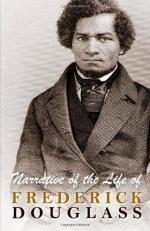A beloved friend from New Bedford prevailed on Mr. Douglass to address the convention: He came forward to the platform with a hesitancy and embarrassment, necessarily the attendants of a sensitive mind in such a novel position. After apologizing for his ignorance, and reminding the audience that slavery was a poor school for the human intellect and heart, he proceeded to narrate some of the facts in his own history as a slave, and in the course of his speech gave utterance to many noble thoughts and thrilling reflections. As soon as he had taken his seat, filled with hope and admiration, I rose, and declared that Patrick Henry, of revolutionary fame, never made a speech more eloquent in the cause of liberty, than the one we had just listened to from the lips of that hunted fugitive. So I believed at that time—such is my belief now. I reminded the audience of the peril which surrounded this self-emancipated young man at the North,—even in Massachusetts, on the soil of the Pilgrim Fathers, among the descendants of revolutionary sires; and I appealed to them, whether they would ever allow him to be carried back into slavery,—law or no law, constitution or no constitution. The response was unanimous and in thunder-tones—“No!” “Will you succor and protect him as a brother-man—a resident of the old Bay State?” “Yes!” shouted the whole mass, with an energy so startling, that the ruthless tyrants south of Mason and Dixon’s line might almost have heard the mighty burst of feeling, and recognized it as the pledge of an invincible determination, on the part of those who gave it, never to betray him that wanders, but to hide the outcast, and firmly to abide the consequences.
It was at once deeply impressed upon my mind, that, if Mr. Douglass could be persuaded to consecrate his time and talents to the promotion of the anti-slavery enterprise, a powerful impetus would be given to it, and a stunning blow at the same time inflicted on northern prejudice against a colored complexion. I therefore endeavored to instil hope and courage into his mind, in order that he might dare to engage in a vocation so anomalous and responsible for a person in his situation; and I was seconded in this effort by warm-hearted friends, especially by the late General Agent of the Massachusetts Anti-Slavery Society, Mr. John A. Collins, whose judgment in this instance entirely coincided with my own. At first, he could give no encouragement; with unfeigned diffidence, he expressed his conviction that he was not adequate to the performance of so great a task; the path marked out was wholly an untrodden one; he was sincerely apprehensive that he should do more harm than good. After much deliberation, however, he consented to make a trial; and ever since that period, he has acted as a lecturing agent, under the auspices either of the American or the Massachusetts Anti-Slavery Society. In labors he has been most abundant; and his success in combating




